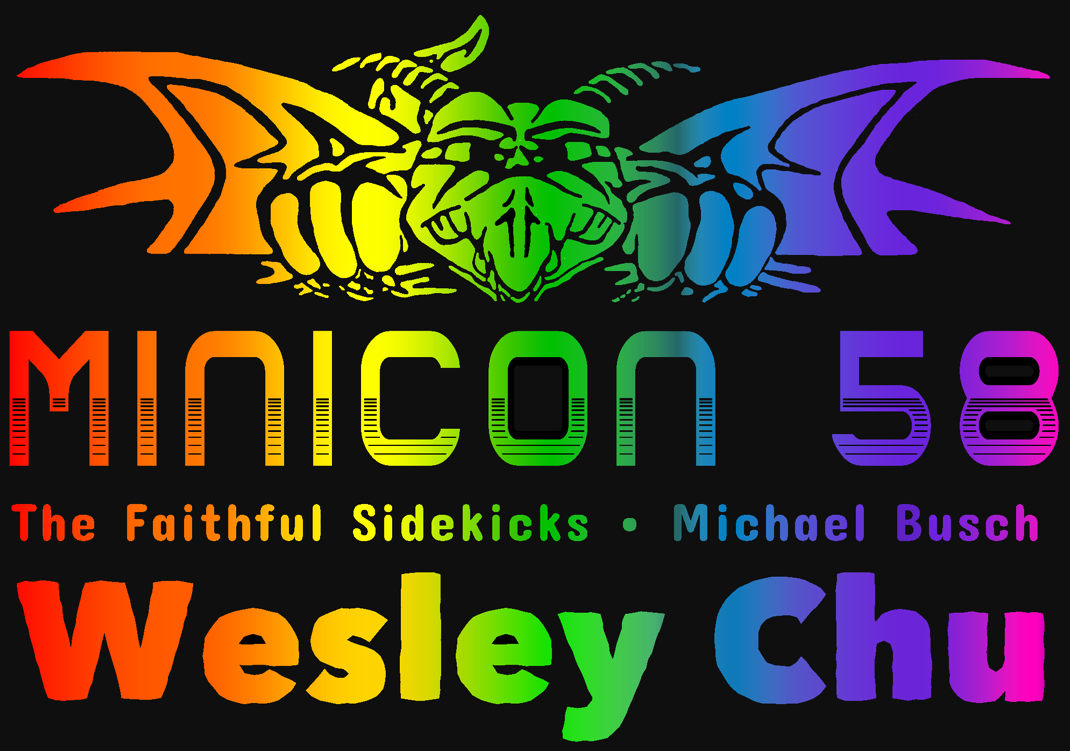Programming
Welcome to Minicon 58
This is a list of panels we expect to happen at Minicon this year.
NOTE: I have a new email address, and many people I have expected to hear from have not answered my programming invitations. If you have been on programming in the past and have been expecting to hear from me, i’m probably in your spam filter. Don’t panic. There are still open spots.
My Minicon address is programming@minicon58.mnstf.org
--Lisa Freitag
Fan Panels
Tabletop Games: Game experts from 2D Con, Friday Game Night and others discuss the best old and new tabletop games. What works? What doesn’t? Anything promising coming out soon?
Who’s Voting for Team Rocket? The Best Worst Anime Characters: Who are your favorite anime villians? Who has the best evil laugh? Who has the best costumes? Who would be most fun to hang out with in bars? On missions? In the hot tub?
Are Classic Science Fiction Books Still Classic?: Science is constantly evolving as new areas of knowledge, sometimes quite specialized, are opened up. Are the books we read “back in the day” still relevant? Does the science hold up? Are there new stories today in which accurate science is featured? Has science fiction changed enough with the times? How can we keep up with developments in space science and technology?
Transitioning Depicted in SF/F: We think of science fiction as being on the cutting edge of both science and sociologic advances. How has SF/F portrayed characters who are non-binary or able to swap genders at will? Has the image changed over the years? How can it be helpful or hurtful to a person who is transitioning?
Knitting in F/SF: In a continuing series about crafting in F/SF, let’s talk about fiber arts and how they are represented in our favorite books and stories. What books feature yarn and thread, weaving and sewing, dyeing and embroidery? Does your favorite fiber art need a book? Knitting is only the beginning.
The Year in SF: A review of science fiction written in the past year, by our expert reviewers.
Modern Censorship: There has always been some degree of censorship, or at least restriction, on who is allowed to read what and what books are allowed to be shelved where. But these days it is not just porn which is under attack by politicians seeing an easy mark. Is book banning a form of censorship? Who is essentially censoring what? What can we do about it?
Hope Survives: Dealing with Hard Times Through F/SF: What do you read when the world seems to be falling apart around you? Do you read dystopian science fiction or cozy comfort fantasies? How can F/SF help us survive in times of bad news and darkness?
Fannish Travel: There are conventions outside of Minneapolis! Some of us actually travel to get to them! Some of us travel to get to Minicon. Fans who travel to attend conventions tell stories of their favorite trips and destinations.
Science Panels
Death By Failure to Communicate: Many engineering disasters are caused by the inability of the engineers to make the managers understand the looming threat. Engineer Karl Gallagher will discuss the ways in which communication failure contributed to several disasters, including the Space Shuttle Challenger launch and the Space Shuttle Columbia destruction on re-entry.
Holocaust Lessons from F/SF: Dina Krause, Chicago fan and docent at the Chicago Holocaust Museum, speaks about the continuing relevance of WWII and the holocaust. Stories from that era have influenced the field of SF/F, and have been retold in interesting ways, both helpful and harmful.
EROS Changed Everything: The possibility of lower-cost access to space raises lots of opportunities and potential disasters. Who will fund and run space progress in the future? When will it happen? How will we bring resources back from asteroids? Can we spot asteroids likely to hit Earth in time to do something about it? Will mining projects create more danger of impacts?
Asteroids and the Solar System: Asteroids are a diverse group of small solar-system objects that never accumulated into planets. Featured astronomer Michael Busch will talk about both near-Earth and main-belt asteroids as parts of the solar system and as targets for space missions. He will also review the impact hazard from near-Earth asteroids and how it is being addressed.
Writing Panels
Writing Fight Scenes and Action Scenes: Our panel of experts discuss how to write a realistic fight scene and use action to advance characterization and plot. Learn to write an action scene that readers won’t want to skip.
Kick-ass Female Characters: Women have been given action roles in both film and on the page for decades now. How has the tough fighting female character developed? Who are the best kick-ass women? How does a writer approach creating a realistic woman warrior?
On Learning How to Write: The pathways to becoming a writer are many and varied. But not everyone can get a degree or attend expensive workshops. Can you learn to write by reading? How about reading and writing fan fiction? Is a beta-reader as good as an editor? Once you decide to sit down and write something, how do you improve your craft?
The Restaurant at the End of the Book: Food often figures heavily in adventuring. Even video games have menus, these days. How do you invent food for your characters? Do you research planetary ecology, or historical cooking, or do you just make it up? Do you have any recipes? What fictional universe would you visit just to sample the cuisine?
Modern Archetypes: Every generation has a hand in shaping the characters and stories they inherit. This panel considers characters created in the past hundred or so years—Peter Pan, Sherlock Holmes, Cthulu, Superman—who are well on their way to becoming legends. Who else is gaining legendary status? How do they influence us as a culture? How might popular franchises like Star Wars or Naruto evolve into myths for the next generation?
Heroic Mothers: Mothers are often minor characters, particularly in young adult fantasy, where they are notoriously absent. They seem to influence the protagonist by being either psychological monsters or lovingly supportive. But what about mothers who have active roles in the story? Are there heroes who are mothers? Villains? How does the real life experience of being a mother (or having a mother) shape a story? Let’s discuss mothers’ potential for complex relationships and as interesting characters.
What Does a Happy Ending Look Like? Many readers, particularly of genre fiction, expect a happy ending. Sometimes it’s obvious, like a marriage, a criminal apprehended, or surviving to sunrise. But perhaps more satisfying stories require more complicated endings. What sort of characters require more nuanced endings? Do readers get upset if they don’t get the perfect ending? What is happiness anyway?
What Happens Next?: How can you use pacing, plot and dramatic timing so your story flows naturally. Is there a difference between genres, story length? What shapes do stories come in? How do you mold a story into shape? Do you start with characters or an idea? Do you let you characters decide?
How to Deal with Writer’s Block: Strategies for when the writing isn’t happening, and keeping it happening when it is. While writing is a solitary pursuit, you don’t have to be alone. Our panel discusses the usefulness of things like NaNoWriMo and FAWM, writer’s groups, Zoom meetings, and even book clubs. How do you keep writing through hard times?
Coding for difference: Both readers and writers have biases in what they expect from characters. How does a writer overcome this to portray diversity? Does the plot follow a different path if the characters are diverse? How does a writer let the reader know that a character is black or Asian or neurodiverse, etc?

